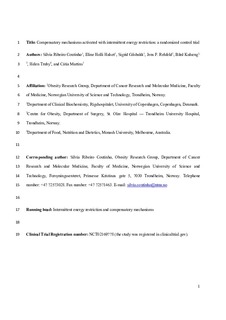Compensatory mechanisms activated with intermittent energy restriction: a randomized trial
Coutinho, Silvia dos Santos Ribeiro F; Halset, Eline Holli; Gåsbakk, Sigrid; Rehfeld, JF; Kulseng, Bård Eirik; Truby, H; Martins, Catia
Journal article, Peer reviewed
Accepted version
Permanent lenke
http://hdl.handle.net/11250/2489159Utgivelsesdato
2017Metadata
Vis full innførselSamlinger
Sammendrag
Background & aims
Strong compensatory responses, with reduced resting metabolic rate (RMR), increased exercise efficiency (ExEff) and appetite, are activated when weight loss (WL) is achieved with continuous energy restriction (CER), which try to restore energy balance. Intermittent energy restriction (IER), where short spells of energy restriction are interspaced by periods of habitual energy intake, may offer some protection in minimizing those responses. We aimed to compare the effect of IER versus CER on body composition and the compensatory responses induced by WL.
Methods
35 adults (age: 39 ± 9 y) with obesity (BMI: 36 ± 4 kg/m2) were randomized to lose a similar weight with an IER (N = 18) or a CER (N = 17) diet over a 12 week period. Macronutrient composition and overall energy restriction (33% reduction) were similar between groups. Body weight/composition, RMR, fasting respiratory quotient (RQ), ExEff (10, 25, and 50 W), subjective appetite ratings (hunger, fullness, desire to eat, and prospective food consumption (PFC)), and appetite-regulating hormones (active ghrelin (AG), cholecystokinin (CCK), total peptide YY (PYY), active glucagon-like peptide-1 (GLP-1), and insulin) were measured before and after WL.
Results
Changes in body weight (≈12.5% WL) and composition were similar in both groups. Fasting RQ and ExEff at 10 W increased in both groups. Losing weight, either by IER or CER dieting, did not induce significant changes in subjective appetite ratings. RMR decreased and ExEff at 25 and 50 W increased (P < 0.001 for all) in IER group only. Basal and postprandial AG increased (P < 0.05) in IER group, whereas basal active GLP-1 decreased (P = 0.033) in CER group only. Postprandial CCK decreased in both groups (P = 0.0012 and P = 0.009 for IER and CER groups, respectively). No between group differences were apparent for any of the outcomes.
Conclusions
The technique used to achieve energy restriction, whether it is continuous or intermittent, does not appear to modulate the compensatory mechanisms activated by weight loss.

